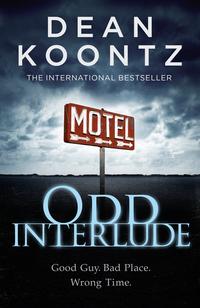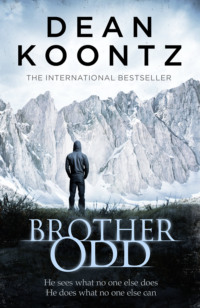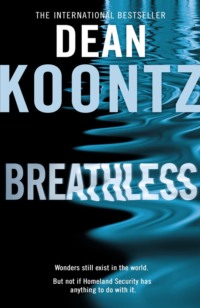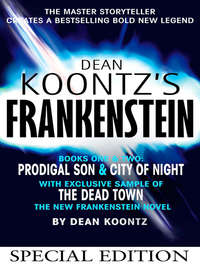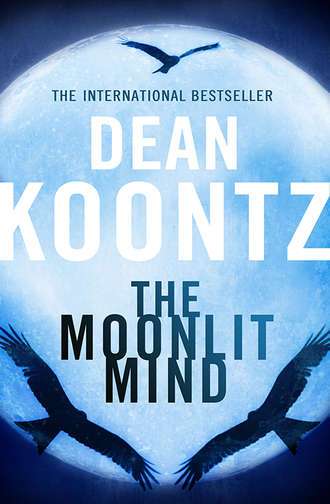
Полная версия
The Moonlit Mind: A Novella

Dean Koontz
The Moonlit Mind
A Tale of Suspense

Contents
Title Page
Chapter 1
Chapter 2
Chapter 3
Chapter 4
Chapter 5
Chapter 6
Chapter 7
Chapter 8
Chapter 9
Chapter 10
Chapter 11
Chapter 12
Chapter 13
Chapter 14
Chapter 15
Chapter 16
Chapter 17
Chapter 18
Chapter 19
Excerpt from 77 Shadow Street
1:The North Elevator
2:The Basement Security Room
3:The Basement Pool
About the Author
Copyright
About the Publisher
1
Crispin lives wild in the city, a feral boy of twelve, and he has no friend but Harley, though Harley never speaks.
Friendship does not depend on conversation. Sometimes the most important communication is not mouth to ear, but heart to heart.
Harley can’t speak because he is a dog. He understands many words, but he isn’t able to form them. He can bark, but he does not. Neither does he growl.
Silence is to Harley as music to a harp, flowing from him in glissando passages and arpeggios that are melodious to Crispin. The boy has heard too much in his few years. Quiet is a symphony to him, and the profound silence in any hushed place is a hymn.
This metropolis, like all others, is an empire of noise. The city rattles, bangs, and thumps. It buzzes and squeals, hisses and roars. Honks, clangs, tolls, jingles, clicks, clacks, creaks, knocks, pops, and rumbles.
Even in this storm of sound, however, quiet havens exist. Across the vast lawns of St. Mary Salome Cemetery, between tall pines and cedars like processions of robed monks, concentric circles of granite headstones lead inward to open-air mausoleum walls where the ashes of the dead are interred behind bronze plaques. The eight-foot-high, freestanding walls are arranged like spokes in a wheel. On any windless night, the massive evergreens of St. Mary Salome muffle the municipal voice, and the wheel of walls baffles it entirely.
At the hub where the spokes meet lies a wide circle of grass and at its center a great round slab of gray granite that serves as a bench. Here, Crispin sometimes sits in moonlight until the silence soothes his soul.
Then he and Harley move to the grass, where the boy prepares his bedroll. With no guilt to claw at his conscience, the dog sleeps the sleep of an innocent. The boy is not so fortunate.
Crispin suffers nightmares. They are based on memories.
Harley seems to dream of running free, toes spreading and paws trembling as he races across imagined meadows. He does not whimper but makes small thin sounds of delight.
Once, when the boy was ten, he woke well past midnight and saw the silvery shimmering form of a woman in a long dress or robe. She approached between two mausoleum walls, seeming not to walk but rather to glide like a skater on ice.
Crispin sat up, frightened because the woman had no substance. Moonlit objects behind her were visible through her.
She neither smiled nor threatened. Her expression was solemn.
She drifted to a stop about two yards from them, her bare feet a few inches above the grass. For a long moment, she gazed upon them.
Crispin felt that he should speak to her. But he could not.
Although the boy only half rose, Harley stood on all fours. Clearly, the dog saw the woman, too. His tail wagged.
When she moved past them, Crispin caught the scent of perfumed ointment. Harley sniffed with what seemed to be pleasure.
The woman evaporated as if she were a fog phantom encountering a warm current of air.
Crispin first thought she must be a ghost haunting these fields of graves. Later he wondered if he’d witnessed instead a visitation, the spirit of Saint Mary Salome, for whom the cemetery was named.
Over the past three years, since he was nine, the boy has lived in this city by his wits and by his daring. He has enjoyed little human companionship or charity.
He doesn’t spend every night in the cemetery. He sleeps in many places to avoid following a routine that might leave him vulnerable to discovery.
In places more ordinary than cemeteries, he and the dog often see extraordinary things. Not all their discoveries are supernatural. Most are as real as sunlight and starlight, and some of those things are more terrible than any ghost or goblin could be.
This city—perhaps any city—is a place of secrets and enigmas. Roaming alone with your dog in realms that others seldom visit, you will glimpse disturbing phenomena and strange presences that suggest the world has dimensions that reason alone cannot explain.
The boy is sometimes afraid, but never the dog.
Neither of them is ever lonely. They are family to each other, but more than family. They are each other’s salvation, each a lamp by which the other finds his way.
Harley was abandoned to the streets. No one but the boy loves this mixed-breed canine, which appears to be half golden retriever and half mystery mutt.
Crispin was not abandoned. He escaped.
And he is hunted.
2
Three years earlier …
Crispin, only nine years old, is two days on the run, having fled a scene of intolerable horror on a night in late September. He has no one to whom he can turn. Those who should be trustworthy have already proven to be evil and to be intent on his destruction.
Of the eleven dollars in his possession when he escaped, he now has only four. He has spent the rest on food and drink purchased from vendors with street-corner carts.
The previous night, he slept in a nest of shrubbery in Statler Park, too exhausted to be fully wakened even by the occasional sirens of passing police cars or, near dawn, by the racket of sanitation workers emptying park trash cans into their truck.
On Monday he spends a couple of the daylight hours visiting the library. The stacks are a maze in which he can hide.
He is too much in the grip of fear and grief to be able to read. Now and then he pages through big glossy travel books, studying the photos, but he has no way of getting to those far, safe places. The children’s picture books that once amused him no longer seem at all funny.
For a while he walks along the banks of the river, watching a few fishermen. The water is gray under a blue sky, and the men seem gray, too, sad and listless. The fish are not biting.
Most of the day he wanders alleyways where he thinks he is less likely to encounter those who are surely looking for him. Behind a restaurant, a kitchen worker asks why he isn’t in school. No good lie occurs to him, and he runs from her.
The day is mild, as were the previous day and night, but suddenly it grows cool and then cooler in the late afternoon. He is wearing a short-sleeved shirt, and the gooseflesh on his bare arms may or may not be caused by the chilly air.
In a vacant lot between a drugstore and a marshal-arts dojo, a Goodwill Industries collection bin overflows with used clothing and other items. Rummaging among those donations, Crispin finds a gray wool sweater that fits him.
He takes also a dark-blue knitted toboggan cap. He pulls it low over his forehead, over the tops of his ears.
Perhaps a nine-year-old boy alone will only call attention to himself by such an effort at disguise. He suspects that the simple cap is, on him, flamboyant. He feels clownish. But he does not strip it off and toss it away.
He has walked so many alleys and serviceways, has darted across so many avenues into so many shadowed backstreets, that he has become not merely lost but also disoriented. The walls of buildings appear to tilt toward or away from him at precarious angles. The cobblestone pavement under his feet resembles large reptilian scales, as though he is walking on the armored back of a sleeping dragon.
The city, always large, seems to have become an entire world, as immense as it is hostile.
With the disorientation comes a quiet desperation that compels Crispin at times to run when he knows full well that no one is in immediate pursuit of him.
Shortly before dusk, in a wide alleyway that serves ancient brick warehouses with stained-concrete loading docks, he encounters the dog. Golden, it approaches along the east side of the passage, in a slant of light from the declining sun.
The dog stops before Crispin, gazing up at him, head cocked. In the last bright light of day, the animal’s eyes are as golden as its coat, pupils small and irises glowing.
The boy senses no threat. He holds out one hand, and the dog nuzzles it for a moment.
When the dog walks past, the boy hesitates but shuffles after him. Unlike his follower, the animal seems to know where he is going, and why.
Cracked concrete steps lead up to a loading dock. The big bay roll-downs are shut, but a man-size door proves to be unlocked and ever-so-slightly ajar.
The dog nudges the door open. With a swish of his white tail, he disappears inside.
Crossing the threshold into darkness, Crispin withdraws a small LED flashlight from a pocket of his jeans. The flash was once in his nightstand drawer. He took it when he fled his home in the first minutes after midnight.
As sharp as a stropped razor, the white beam cuts through the gloom, revealing a long-abandoned, windowless space large enough to serve as a hangar for jet airliners. High overhead are storage lofts and catwalks.
Everything is shrouded in gray dust. Rust as layered as pastry dough flakes and peels from metal surfaces.
Scattered across the concrete floor are rat bones and the shells of dead beetles. Old playing cards spotted with mold. Here a one-eyed jack, there a queen of hearts and a king of clubs, and there four sixes laid out side by side. Cigarette butts. Broken beer bottles.
The flashlight finds a spider crawling on a low-hanging loop of cable, projecting its enlarged shadow on a wall, where it creeps like a creature in one of those old movies about insects made enormous by atomic radiation.
Without need of the flashlight, the dog finds his way around the sprays of glass. In such an odorous place, most dogs would weave from smell to smell, their noses to the floor. But this one carries his head high, alert.
At the north end of the great room are three doors leading to three offices, each with a window looking out upon the warehouse. Two doors are closed, the other ajar.
Beyond the gap between the third door and the jamb, an amber light pulses.
Crispin halts, but the dog does not. After a hesitation, the boy follows the animal into the illumined chamber.
Between two groups of fat candles—three to his left, three to his right—a man in his late twenties sits with his back against a wall, his legs straight out in front of him.
His glassy blue eyes stare but do not see. His mouth hangs open, but he has used all the words that he was born to speak.
Beside one trio of candles lies a sooty spoon. Next to the spoon is a plastic packet from which spills a white powder. In his lap lies a hypodermic syringe emptied of its contents.
The right sleeve of his checkered shirt is rolled up past the crook of his elbow, where blood earlier trickled from a puncture. Evidently he had some difficulty finding the vein.
Crispin is not afraid in the presence of a dead man. He has recently witnessed much worse than this.
With a keen intention more human than canine, the dog goes to a backpack lying beyond the candles, takes one of its straps between his teeth, and drags it away from the corpse.
The boy supposes that the bag must contain dog treats. On his knees, searching the various compartments, however, he finds no evidence that the dead man ever provided for the animal.
A quick scan of the dust-covered floor and the few paw prints suggests that the dog has never been here before, that he was led here by scent, not by experience. Yet …
Among the greasy, mostly worthless possessions of the deceased, Crispin discovers two stuffsacks full of currency rolled into tight bundles and held together by rubber bands. There are wads of five-, ten-, and twenty-dollar bills.
The money is most likely stolen or otherwise dirty. But no one, not even the police, will be likely to discover from whom the dead man has swiped this fortune or by what illegal activity he might have earned it.
Taking money from the body of a homeless loner surely can’t be theft. The man has no need of it anymore.
Nevertheless, the boy hesitates.
After a while, he feels that he is being watched. He looks up, half expecting that the corpse’s gaze has shifted toward him.
Eyes bright with candlelight, the dog studies him, panting softly as if in expectation.
Crispin has nowhere to go. And if he thinks of somewhere to go, he currently has only four dollars to get there.
The dog seems not to have belonged to the dead man. Whatever his provenance, however, Crispin will need to feed him.
He returns the wads of cash to the stuffsacks and pulls tight the drawstring tops. The backpack is too big for him. He will take only the money.
At the threshold, Crispin glances back. Candlelight creates an illusion of life in dead eyes. With reflections of flame throbbing across the slack face, the drug addict seems to be a man of glass, a lamp aglow from within.
As they retrace their steps through the enormous warehouse, the dog halts to sniff one of the moldy playing cards lying on the floor. It is the six of diamonds.
When Crispin passed this way earlier, four sixes had lain at this spot, one in every suit.
He surveys the immense dark room, probing this way and that with the flashlight. No one appears. No voice threatens. He and the dog seem to be alone.
The LED beam, arcing across the littered floor, cannot locate the missing sixes.
Outside, in the alleyway, the western sky is crimson, but the twilight is overall purple. The very air seems violet.
In a pet shop on Monroe Avenue, he buys a collar and leash. From now on, the dog will wear the collar at all times, so that he will not appear to be a stray. Crispin will use the leash only on public streets, where there is a risk of attracting the attention of an animal-control officer.
He also buys a bag of carob biscuits, a metal-toothed grooming comb, and a collapsible water dish.
At a sporting-goods store, he ties the dog to a lamppost and leaves him long enough to go inside and buy a backpack of the size that kids need to carry books to and from school. He puts the stuffsacks of money and his pet-store purchases in the pack.
Their dinner is hot dogs from a street vendor. Coke for the boy, bottled water for the dog.
At a novelty store specializing in magic tricks and games of all kinds, Crispin window-shops for a minute or two. He decides to buy a deck of cards, though he’s not sure why.
As Crispin is tying the dog to a rack designed for securing bicycles against theft, the owner of the novelty store opens the door, causing a silvery ringing from an annunciating bell. He says, “Come, lad. Dogs are welcome here.”
The owner is elderly, with white hair and bushy white eyebrows. His eyes are green, and they sparkle like sequins. He wears six emerald rings on various fingers, all as green—but none as sparkly—as his eyes.
“What is your pooch’s name?” the old man asks.
“He doesn’t have one yet.”
“Never leave an animal unnamed for long,” the old man declares. “If it doesn’t have a name, it’s not protected.”
“Protected from what?”
“From any dark spirit that might decide to take up residence in it,” the old man replies. He smiles and winks, but something in his merry eyes suggests that he is not kidding. “We’re closing in fifteen minutes,” he adds. “Can I help you find something?”
A few minutes later, as Crispin pays for the deck of cards, a white-haired woman ascends from the basement and comes through an open door with a large but apparently not heavy box of merchandise. She has a smile as warm as that of the man, who is perhaps her husband.
When she sees the dog, she halts, cocks her head, and says, “Young fella, your furry friend here has an aura that a pious archbishop couldn’t match.”
Crispin has no idea what that means. But he thanks her shyly.
As the woman busies herself restocking a case of magic tricks, and as the many-ringed old man explains a three-dimensional puzzle to another customer, Crispin takes bold action that surprises him. With the dog, he goes to the open door and down the stairs to the basement, unnoticed by the proprietors of the shop.
Below lies a storeroom with rows of freestanding metal shelves crammed with merchandise. There is also a small lavatory with sink and toilet.
Boy and dog take shelter behind the last row of shelves. Here, they can’t be seen from the stairs.
Crispin doesn’t worry that the dog might bark and reveal their presence. He already knows that, in some mysterious way, he and this animal are in synch. He unclips the leash from the collar, coils it, and puts it aside.
After a while, the lights are switched off from the top of the stairs. The door closes up there. For a few minutes, footsteps echo overhead, but soon all is silent.
They wait in the dark until they can be certain the store is closed for the night. Eventually, they make their way back through the stockroom, along the metal shelves, to the foot of the stairs.
Crispin is blind, but perhaps the dog is not. The boy fumbles for the light switch at the bottom of the steps. The dog, standing on its hind feet, finds it first, and the overhead fixtures brighten.
On one shelf, Crispin discovers a stack of quilted blue moving blankets. With them, he makes a bed in a corner, on the floor.
While Crispin strips the rubber bands from the wads of cash and places the flattened bills in three stacks according to denomination, he feeds the dog some of the cookies that he bought at the pet shop.
Together they count their fortune. Crispin announces the total—“Six thousand, seven hundred, forty-five dollars”—and the dog seems to agree with his math. He rolls the money into tight bundles again and returns them to the stuffsacks.
They will not starve. With this much money, they will be able to hide out for a long time, moving every night to a new refuge.
Exhausted, the boy lies back in the pile of blankets. The dog curls up beside him, its head on his abdomen.
Crispin gently rubs behind the dog’s ears.
As sleep is descending upon him, the boy thinks of the dead drug addict, mouth yawning and teeth yellow in the candlelight. He shivers but surrenders to his weariness.
In the dream, Crispin’s younger brother lies on a long white-marble table. His hands and feet are shackled to steel rings. A hard green apple is crammed into his mouth, stretching his jaws painfully. The apple is held in place by an elastic strap that is tied securely at the back of the boy’s head. His teeth are sunk into the fruit, but he isn’t able to bite through it and spit out the pieces.
The raised dagger has a remarkable serpentine blade.
Like a shining liquid, light drizzles along the cutting edge.
The cords of muscle in Crispin’s brother’s neck are taut. The arteries swell and throb as his heart slams great tides of blood through his body.
The apple stifles his screams. He seems also to be choking on a flood of his own saliva.
Crispin wakes in a sweat, crying his brother’s name: “Harley!”
For a moment he doesn’t know where he is. But then he realizes that he is under the shop of magic and games.
You can undo what has been done and still save them.
Those words whisper through his mind, but they seem like nothing more than wishful thinking.
When the terror recedes, he knows that he has found the perfect name for the dog. It is a name that will protect the animal from any malevolent spirit that might wish to enter him.
“Harley,” Crispin repeats softly. He names the dog for his lost brother. “Harley.”
The dog gently but insistently licks his hand.
3
All these years later …
The night is cool, the sky deep, the stars as sharp as stiletto points.
At twelve, Crispin is strong and tougher than any boy his age should have to be. His senses are sharp, as is his intuition, as if from his association with four-legged Harley, he has acquired some of the dog’s keen perceptions.
This October night, the streets are filled with goblins and witches, vampires and zombies, sexy Gypsy women and superheroes. Some hide behind masks that look like certain despised politicians, and others wear the faces of leering swine, red-eyed goats, and serpents with forked tongues.
These people are on their way to parties in seedy lounges, in modest workingmen’s clubs, and in the ballrooms of older hotels that are desperate to have a profitable night in this economy that has been a mean Halloween for more than three years.
In this lower-middle-class district, Crispin feels safe enough to wander the streets, scoping the scene, enjoying the costumes and the bustle and the decorations. Halloween is swiftly becoming one of the biggest holidays of the year.
The people whom he fears are not of this neighborhood. They are not likely to descend to these streets for any celebration. Their tastes are more expensive and more exotic than anything that can be provided here.
Three months have passed since his most recent encounter with them. They had almost caught him in an old elementary school slated for eventual demolition.
His mistake then was to spend too many nights in the same place. If he remains on the move, they have greater difficulty locating him.
Crispin doesn’t know why being stationary too long puts him at risk. It’s as if his scent becomes concentrated when he lingers in one place.
He knows the legend of the Wandering Jew who struck Christ on the day of the crucifixion and was then condemned to roam the world forever without rest. Some say this condemnation was in fact an act of grace because the devil can’t find and take a man whose remorse drives him to wander ceaselessly in search of absolution.
In addition to his good dog, Crispin’s constant companion is remorse. That he could not save his brother. That he could not save his little sister. That he was so long blind to the truth of their stepfather and to the treachery of their unloving mother.
Now he and Harley pass a two-story buff-brick building that houses the local VFW post. The structure seems to tremble and swell with the muffled backbeat of a band playing an old Beatles tune, as if such rock and roll can’t be constrained without risk of explosion.
A wave of laughter and chatter and louder music washes across the sidewalk when two men, fumbling packs of cigarettes from their pockets, push open the door and step outside for a smoke. One is dressed as a pirate. The other wears a tuxedo, a fake goatee, and a pair of horns.
They glance at Crispin. The devil thumbs flame from a butane lighter.



